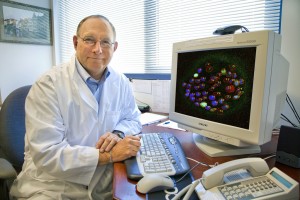The U.S. Department of Energy’s Lawrence Berkeley National Laboratory (Berkeley Lab) has been selected by the National Cancer Institute (NCI) to host one of 11 new Centers for Cancer Systems Biology (CCSB). Under this grant, Berkeley Lab expects to receive about $13.5 million over the next five years to develop computational models that predict breast cancer responses to therapeutic agents.
“We’re proud to have been selected by NCI to be a part of its effort to study cancer as a systemic disease, an effort we feel is critical to the future of cancer research,” said Joe Gray, director of Berkeley Lab’s Life Sciences Division and co-director of the new CCSB at Berkeley. “Our work will help advance the development of breast cancer diagnostic and therapeutic strategies that are effective and durable.”

Renowned cancer researcher Joe Gray will co-direct a new Center for Cancer Systems Biology hosted at Berkeley Lab and funded by the National Cancer Institute. (Photo by Roy Kaltschmidt, Berkeley Lab Public Affairs)
Gray, a renowned cancer researcher, holds a joint appointment with the University of California (UC) San Francisco, where he is an adjunct professor of laboratory medicine and co-leader of the breast cancer oncology program at the Helen Diller Family Comprehensive Cancer Center. He will co-direct the new NCI CCSB with Claire Tomlin of UC Berkeley, where she is a professor of electrical engineering and computer sciences. Tomlin is a leading authority on the theory and design of models that predict the behavior of complex systems.
Traditional cancer research has concentrated on the identification and functional characterization of molecular defects. However, modern genomic analysis technologies show that individual cancers may involve the deregulation of hundreds to thousands of interacting genes. Consequently, within the cancer research community there is a move to treat cancer as a “systems biology” or network disease, in which breakdowns in regulatory molecular networks disrupt the normal restraints on a cell’s growth and behavior. That the exact details of these networks often vary between clinically similar cancers helps explain why some patients will respond favorably to a specific cancer drug while others won’t. In addition, the nature of these regulatory networks is such that they tend to resist therapeutic interventions.
“Research at our CCSB will focus on development of experimentally validated computational models that predict the responses of ductal breast cancers to the growing number of therapeutic agents that target aberrant receptor tyrosine kinase signaling,” Gray said.
Receptor tyrosine kinases (RTKs) are enzymes that form central components of cell signaling networks. They’ve been shown not only to be key regulators of normal cellular processes but to also have a critical role in the development and progression of many forms of cancer, including breast cancer.
Said Gray, “Despite the growing availability of a broad range of RTK network-targeted drugs responses vary substantially between patients and are often not durable. Our premise is that development of optimal RTK network-targeted drug combinations will require experimentally validated, computational models of the diverse resistance and response mechanisms that are specific to cancer subtypes and allow drug combinations to be tested in silico so that the most promising can be prioritized for clinical evaluation.”
In addition to researchers from Berkeley Lab and the UC campuses of Berkeley and San Francisco, the new CCBS at Berkeley will also involve participants from the MD Anderson Cancer Center at the University of Texas, and the University of Warwick in the United Kingdom. Experimental aspects of the research will be carried out at Berkely Lab and UC San Francisco, while computational work will be conducted at all the participating institutions. Principal investigators will include Berkeley Lab’s Paul Spellman, Michael Korn of UCSF, Gordon Mills at MD Anderson, and Sach Mukherjee in England.
The CCBS hosted at Berkeley Lab and those at the other ten nationwide host sites are part of the Integrative Cancer Biology Program (ICBP), the primary sponsor of NCI’s cancer systems biology research.
Said ICBP director Dan Gallahan, “These centers represent a unique multidisciplinary union of outstanding scientists and clinicians who will work to unravel the complexities of cancer through the novel application of technology and mathematical modeling. Their discoveries and models will be critical to our continued success in understanding and treating cancer disease.”
Added NCI director John E. Niederhuber, M.D., “This program is part of the next generation of cancer research, in that it will approach the disease from a holistic or comprehensive viewpoint in order to understand how all of the components of the disease fit together.”
Berkeley Lab is a U.S. Department of Energy national laboratory located in Berkeley, California. It conducts unclassified scientific research and is managed by the University of California. Visit our website at http://www.lbl.gov.
Additional Information
For more information about the research of Joe Gray visit his Website at http://www.lbl.gov/lsd/People_&_Organization/Scientific_Staff_Directory/Gray_Lab.html
For more information about the National Cancer Institute’s Integrative Cancer Biology Program visit the Website at http://icbp.nci.nih.gov/